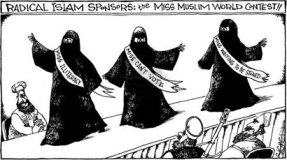A Tacoma judge is under fire for kicking a Muslim woman out of his courtroom after she refused to remove her head-scarf. “I felt humiliated,” said 37-year old Mujaahidah Sayfullah, who has worn her head-scarf in court before.
She says she couldn’t believe it when first the bailiff and then Tacoma Municipal Court Judge David Ladenburg told her as she sat in the audience that either her head-scarf could go – or she could. “He said, ‘well, if you’re not gonna do it then I’m going to have to ask you to remove yourself from the courtroom,'” she said.
She left, fearing the judge would take it out on the relative who was on trial.
Judge Ladenburg stands by his decision. “It’s my understanding and belief that the Muslim religion does not prohibit the removal of head-coverings either for males of for females,” he says…noting that unless he learns that an exception should be made, there’s a courtroom standard that must be upheld.
Ladenburg says it wasn’t religious discrimination…but Mujaahidah says it sure felt like it, and that’s why she’s telling her story. “Just for it to be exposed, and the public be aware that people are able to blatantly discriminate based upon their position of power,” she said.
The Council on American-Islamic relations has sent a note to Ladenburg, notifying him of the allegations against him. Ladenburg says he plans to respond.

 “The Muslim world is a strange and formidable place to an average American, in some ways a perennial zone of magic, mystery and disorder,” said Dr Ghazi Falah, of the University of Akron, Ohio, on Monday at the American University of Beirut. It is regarded in “a framework of violence, disorder and unreason contrasted with the rationalism of the West.”
“The Muslim world is a strange and formidable place to an average American, in some ways a perennial zone of magic, mystery and disorder,” said Dr Ghazi Falah, of the University of Akron, Ohio, on Monday at the American University of Beirut. It is regarded in “a framework of violence, disorder and unreason contrasted with the rationalism of the West.”